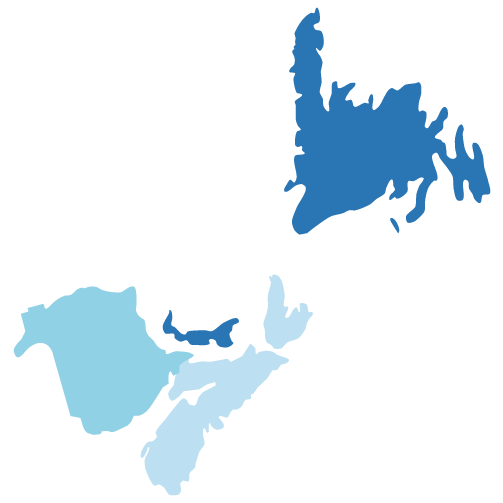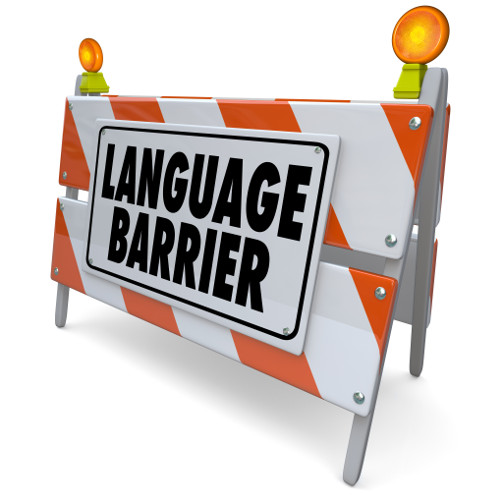
Identifying Your Need
Complete a Human Resource Plan
Before undertaking any human resource strategy such as hiring immigrants to support your business objective, it is important for you to identify your current and future human resource needs. As a business owner or manager this is something you undoubtedly do in some capacity on a daily basis. The steps below are just some ideas to help guide you in this process.

Review both the internal and external factors that could impact your company’s ability to meet its objectives.
Below are a few factors to consider:
Internal Factors
- Your current workforce demographics (age/location), skills, etc.
- Changes in organizational structure
- Employee Retention/Turnover
External Factors
- Workforce trends in Atlantic Canada (See A Shrinking Labour Force)
- Quality of applicants for jobs posted
- Workforce needs in Trucking (See Trucking in Canada)
- Legislative changes
- Changing technology
- Economic conditions
Identify Your Gaps
Based on Step 1 and Step 2, identify your company’s current and future human resource needs. Consider the following:
- Do you have gaps or do you anticipate gaps in a specific occupation? What skills, knowledge or attributes will you need to align with your overall business needs?
- Can these gaps be filled with some of your current workforce through career development plans and training?
- Have you considered your legislative responsibility under the Employment Equity Act and taken active steps to recruit and retain talent from underrepresented groups in Canada and permanent residents already residing in Canada? Have you reached out to the schools in your area to mentor and invest in new graduates?
Develop your Action Plan
Once you have identified the gaps and/or the future needs of your human resources, you now need to make a plan. When developing your plan, consider:
- Time frames needed
- Direction to take based on the gaps identified
- Cost considerations
- A Communication Plan to inform and engage all employees and managers to ensure the plan is understood and supported
Monitor and Evaluate
A human resources plan is one that may change as it develops. Constant measuring and monitoring may result in adjustments. Setting goals and making plans are only the first steps to success. Continuous review and adjustment if needed are vital to stay relevant with business goals and objectives.
Remember -
It is your right to have the best-qualified people who are the right fit for your business as they will have a positive impact on your bottom line!
Developing Job Descriptions
Once your Human Resource Plan has been developed, you now need to develop or review the job description of the position(s) you need to fill in order to ensure you are clearly defining the role and attracting the right people in your job postings.
To ensure you are being inclusive of immigrants and those that may have been internationally trained, here are some tips to consider:
- To explore occupations by essential skills profiles, check out this Government of Canada link
- To learn about the impact that essential skills are having on your business in the trucking industry, check out Essential Skills THRSC Atlantic
Make use of resources available to help structure your job description in a standardized manner.
- The National Occupation Classifications (NOC), a Government of Canada resource that provides a standard way of describing the occupation with main duties and requirements
- For more information on where to find regulated professions and license requirements specific for some common occupations in the trucking industry in this toolkit entitled Verifying Foreign Credentials.
- For example, when hiring a commercial driver from outside Canada you may want to focus on transferable knowledge and skills such as weights and dimensions, operating systems, hours of service guidelines, etc. If the applicant understands and can explain the laws under which he/she operates, it will be easier to orient them into the laws required to operate in Canada.
Recruitment
Internationally trained workers are people who are educated and trained in other countries and who have obtained their work experience outside of Canada. As the Canadian-born workforce is declining, it is important for employers to consider internationally trained workers when they cannot find qualified CANADIANS to fill positions needed.

For the purpose of this toolkit, internationally trained workers will be defined as:
Although these programs/systems are offered to employers with services and supports designed so that employers can make application on their own, there are immigration recruitment agencies and/or immigration consultants that can help employers with recruitment and the various applications required for a fee. This cost is the employer’s to bear and under no circumstances can it be recovered from the employee.
When choosing an Immigration Recruiter or Consultant consider the tips below:
Tips to Consider when Selecting a Third-Party Recruiter
Ensure the agency or consultant you use is licensed and in good standing to perform these services by consulting the national regulatory body known as the Immigration Consultants of Canada Regulatory Council (ICCRC)
If you are an Employer in the province of Nova Scotia, you must also ensure that you use a recruiter licensed by the Nova Scotia Labour Standards. For more information on licensed recruiters in Nova Scotia, please visit Labour and Advanced Education – List of Licensed Recruiters

Permanent Residents
Permanent Residents are internationally trained workers who are already residing in Canada. They have been given permanent resident status by immigrating to Canada but do not have Canadian citizenship. They can work and live anywhere in Canada without needing further documentation or permits the same as any Canadian citizen.
To find out more about the Permanent Resident status, please refer to:
https://www.canada.ca/en/immigration-refugees-citizenship/services/new-immigrants/pr-card/understand-pr-status.html
To recruit Permanent Residents to your business you can employ many of the same methods you employ to recruit other local Canadian talent. You can also reach out to your local settlement agency, which may be able to match you up with internationally trained job seekers in your area.
Traditional Recruitment Methods
Job Fairs can also give you the opportunity to meet potential candidates face to face. Consider being an exhibitor at the local Career, Education and Settlement Canadian Immigrant Fair.
Did you know...
Atlantic Provinces Trucking Association’s Opportunity Board
(note: this service is free for members)
Axis Career Services for Job Postings
(specifically for permanent residents looking for employment in Newfoundland)
Settlement Agencies
The best source for employers looking to hire permanent residents is the settlement agencies found throughout Atlantic Canada. Many of these agencies offer services to help newcomers find employment and to match employer’s with their clients based on the skills needed.
To find a settlement agency in your area, you can search the Government of Canada website or you can check out those listed under Current ARAISA Members on the Atlantic Region Association of Immigrant Serving Agencies website.
Below some examples of the recruitment services these settlement agencies are providing to employers:
NEWFOUNDLAND
AXIS Career Services is the employment division of the Association for New Canadians (ANC) in Newfoundland and Labrador. They offer a variety of programs to try and match employers with potential employees from their labour pool of internationally trained clients. Employers can post jobs and browse resumes in a skills matching database.
They also offer Bridge to Work programs that are meant to accelerate the newcomer’s integration and inclusion into Canadian workplaces woth mentoring, unpaid work placements and paid 12-week internships. (Wage subsidies may be available.)
NOVA SCOTIA
The Immigration Services Association of Nova Scotia (ISANS) also has programs and services available to help employers recruit internationally trained and skilled workers already residing in Nova Scotia.
They offer a Skills Match Program which gives employers direct access to their skilled labour pool. They also offer employers On-Site Recruitment and Information Sessions (ORIS) where employers present information about their organization, job opportunities and recruitment process to pre-screened job ready applicants followed by brief interview sessions. Another similar program is the On-Site Career Information Sessions (OCIS) which are On-site Career Information Sessions for employers who may not have immediate recruitment needs but are interested in meeting with immigrant job seekers to inform them about career opportunities with their companies.
PRINCE EDWARD ISLAND
Employers in Prince Edward Island can access services from the PEI Association for Newcomers to Canada highlighted under Opportunities for Employers.
This settlement agency offers businesses several services to aid in their recruitment efforts. Business Information and Recruitment Sessions with the group of newcomers they serve is one such program. They will organize, host and register the newcomers attending your presentation at no charge. They will distribute your job advertisement to their clients who are seeking employment and help you pre-screen applicants based upon your specifications.
NEW BRUNSWICK
In New Brunswick there are 13 different settlement agencies in various regions that support the permanent resident in their respective areas. Each agency has its own unique services to best meet the needs of permanent residents in their local communities, however, all operate under the umbrella of the New Brunswick Multicultural Council.
To check out the various settlement agencies in New Brunswick and what regions they serve, please visit the Member’s Page of the New Brunswick Multicultural Council’s website.
To access government programs that may be used to subsidize and/or enhance the integration experience of the permanent worker into local companies, please visit New Brunswick Post-Secondary Education, Training and Labour – Employment Development Offices.
Temporary Foreign Workers
For employers who have been unable to recruit Canadian citizens or permanent residents for job vacancies, the Temporary Foreign Worker Program (TFWP) makes it possible to hire foreign national workers to temporarily fill the labour shortage for an authorized period of time in skills levels C & D as long as it does not have a negative impact on the Canadian labour market.
To find out the skill type or level of an occupation visit Find Your NOC at https://www.canada.ca/en/immigration-refugees-citizenship/services/immigrate-canada/express-entry/eligibility/find-national-occupation-code.html#find
Although most temporary foreign workers are hired to address a specific, short-term labour need, some temporary foreign workers who come to fill a temporary vacancy can transition to permanent residents.
The Globe and Mail (May 2014) Everything you need to know about temporary foreign workers
From a report by the Atlantic Provinces Economic Council as reported on Alison Auld, The Canadian Press (May 2014) Temporary Foreign Workers In Maritimes Tripled In 7 Years: Report
Recruiting Temporary Foreign Workers
There are generally 4 steps to recruiting Temporary Foreign Workers from outside Canada depending on the job offer and the foreign worker’s country of citizenship and last place of permanent residence. As with any application process, accurate and complete information is key to avoiding unnecessary delays.
Step 1: Determine if the Labour Market Impact Assessment (LMIA) is required
The purpose of the LMIA is:
- To assess the impact of bringing in the foreign worker will have on the labour market for that particular occupation;
- To ensure Canadians and permanent residents have first access to jobs in Canada;
- To ensure the employer will pay and treat the foreign worker fairly.
Step 2: Apply for the Labour Market Impact Assessment
If the job vacancy you have requires an LMIA, the employer will need to complete an application. The employer can make initial application for a NAMED or UNNAMED LMIA. The requirements on the application will also vary depending on the wage being offered for the position.
NAMED LMIA
- If the temporary foreign worker has already been selected, you will be required to complete the details of the candidate on the LMIA application.
- The LMIA is valid for 6 months from the date of issue noted on the approval letter and the candidate must apply for a work permit based on the LMIA within that time frame.
- If for some reason your named candidate(s) is no longer available for employment you can substitute up to 50% of the names on the LMIA (If only one on the application you can replace) if it is within the 6 month time frame.
UNNAMED LMIA
- Oftentimes employers will secure a positive LMIA before candidate selection. In that case they will apply for a LMIA that does not have candidate information on it and is considered Unnamed and the employer will receive an authorization letter stating that..
- When issued the employer will have 6 months from the date to find a suitable candidate.
- Once selected, the candidate’s name and details will have to be sent to ESDC where a revised “Named” LMIA Authorization letter will be issued.
- The candidate will need to use this named LMIA to apply for the work permit.
WAGE CONSIDERATIONS FOR THE POSITION OFFERED
LMIA application requirements can also differ depending on whether the position is considered a “high-wage” or a “low-wage” position. This is determination is made based on whether the job offered is above or below the median provincial wage. To determine the median provincial wage for the province in which you are making application, visit the Government of Canada website at: Hire a temporary foreign worker in a high-wage or low-wage position.
Applications for high-wage positions require the filing of a Transition Plan that requires the employer to outline the steps they are committed to take to reduce their reliance on temporary foreign workers. For information on how to apply visit: Hire a temporary foreign worker in a high-wage position.
The Transition Plan is a human resource strategy employers have to include in their application that explains what measures the employer will take to transition these jobs to Canadian and permanent resident job seekers through strategies targeting underrepresented and underemployed persons.
The Government of Canada can assist employers with funding programs such as Canada Job Grant and Apprenticeship Grants that are designed to specifically help employers with this transitional strategy.
For more information on determining the Cap for your organization if you are applying for low wage positions please visit: Schedule E – Cap for Low-Wage Positions.
COST AND SUBMISSION OF LMIA APPLICATION
The application fee for LMIA requests is currently $1000 per worker. For up-to-date cost and any changes, please visit: Temporary Foreign Worker Program Overhaul: What Employers Need to Know
It is important for employers to submit their LMIA Application to the appropriate LMIA Processing Centers to avoid any delays. To find out where your application should be sent or if you have any specific questions, visit the Government of Canada website at: Service Canada Labour Market Impact Assessment Processing Centres
AFTER SUBMISSION OF APPLICATION
Service Canada or Employment and Social Development Canada (ESDC) will process the application submitted. If the application is successful, the employer will receive a “positive LMIA.” PLEASE NOTE: This does not guarantee that a work permit /visa will be issued. If Service Canada rejects the employer’s application to recruit a foreign worker for the position or positions applied, the employer will receive a “negative LMIA”. This decision can be appealed if new or additional information becomes available. To find out more about the reasons a negative LMIA can be issued, visit: Employers who were issued a negative Labour Market Impact Assessment (from June 20 to December 31, 2014).
Step 3: Find a suitable candidate and make a valid job offer
If he/she is unknown, the employer will need to recruit the international worker. This can be done by:
- Posting your job opening on an on-line job board that you currently use. Be sure to note you are an equal opportunity employer and are open to internationally trained applicants.
- Participate in an International Job Fair abroad sponsored by local government agencies. For example:
- In New Brunswick contact Population Growth Division, Department of Post-Secondary Education, Training and Labour at (506) 453-3981 for more details.
- In Nova Scotia contact the Nova Scotia Office of Immigration and find out about their Multi-Sector Skills Recruitment Missions at (902) 424-6864
- In Newfoundland contact the Provincial Nominee Program that can offer opportunities for employers to attend recruitment missions in other countries where skilled workers can be found. Call 709-729-6607 for more information.
- In Prince Edward Island contact the Prince Edward Island Office of Immigration for information on Recruitment Missions at 902-620-3659.
- A third-party recruiter can take care of some or most of the recruitment process for you. If using a third-party recruiter don’t forget to follow Tips to Consider when Selecting a Third-Party Recruiter.
Once the suitable candidate has been found, you will need to make a valid job offer. You must also notify Service Canada with details of the potential candidate. Upon receipt of this information, Service Canada will issue the employer a revised “Named LMIA.” Once you receive the revised LMIA with candidate’s name attached, forward it to him/her so he/she can apply for work permit.
Step 4: Advise the potential candidate about applying and obtaining the Work Permit.
Once you have received a positive LMIA and your potential candidate’s name has been added to that LMIA, you will need to send it, along with a signed Valid Job Offer for him or her to apply for their work permit. Also, forward him/her the Government of Canada website which outlines how he/she can apply on-line or on paper. It is important to let them know that there will be a fee for their application.
Check out up-to-date processing times for work permit applications at:
Check application processing times.
Once the application has been processed and approved, the candidate will receive a letter of introduction and can enter the country. At the port of entry, the candidate will have all his/her documentation reviewed by a Canada Border Service Agent (CBSA) who can issue the Temporary Work Permit. It must be noted that CBSA can decline issuing the work permit based on security or other reasons at his/her discretion. For more information on this process, visit: After you apply: get next steps.
COMPLIANCE
Employers must meet specific requirements to hire foreign workers and uphold the conditions as set out in the Immigration and Refugee Protection Regulations (IRPR). Employers of temporary foreign workers are expected to be aware of their responsibilities and obligations under the Immigration and Refugee Protection Act (IRPA), and the IRPR. For more information, visit: Temporary Foreign Worker Program compliance.
Although most temporary foreign workers are hired to address a specific, short-term labour need, some temporary foreign workers who come to fill a temporary vacancy can transition to permanent residence. To find out more, check out the Provincial Nominee Program located in the province of residence for the temporary foreign worker.
The overall total includes about
In 2011, more than
Express Entry System
If you cannot find Canadians or permanent residents to fill job vacancies, you may be able to hire candidates who can immigrant to Canada on a permanent basis based on their classification by the federal government as ‘skilled’ workers. Express Entry is a new system the federal government now uses to manage applications for permanent immigration to Canada.
Express Entry candidates who can be considered for permanent immigration must be eligible for and seeking employment at Skill Type 0, or Levels A or B according to the 2011 National Occupational Classification (NOC). To find out the skill type or level an occupation visit Find Your NOC.

Under the Express Entry System:
- An international candidate must complete a profile on-line under the Government of Canada website entitled, Fill out your profile – Skilled immigrants (Express Entry).
- Once they have created their profile, the system will rate them based on a Comprehensive Ranking System, which awards points based on:
- human capital (age, education, official language proficiency and work experience);
- additional factors (qualifying offer of arranged employment or Canadian educational credentials);
- and, a provincial or territorial nomination.
- Applicants that meet the criteria of one of the three programs offered by the federal government are entered into the Express Entry pool where they are then issued an Invitation to Apply for the program in which they appear to meet the criteria.
- A permanent immigrant candidate without a valid job offer or a provincial nomination certificate will be required to register with Employment and Social Development Canada’s (ESDC) Job Bank. The Job Bank will help connect Express Entry candidates with eligible employers in Canada.
- If the candidate does have a job offer or a provincial nomination certificate, he/she will still be required to create an Express Entry Profile.
INTERESTING TO NOTE:
The Express Entry Pool provides employers with a cost effective opportunity to recruit internationally trained workers living outside of Canada when they cannot fill vacancies with Canadians and permanent residents.
For more information see: Express Entry: What employers need to know
FINDING SKILLED FOREIGN WORKERS
If you cannot find a potential skilled candidate already in the Express Entry System, you can recruit an internationally trained foreign worker by:
- Posting your job opening on an on-line job board that you currently use. Be sure to note you are an equal opportunity employer and are open to internationally trained applicants.
- Participate in an International Job Fair abroad sponsored by local government agencies. For example:
- In New Brunswick contact Population Growth Division, Department of Post-Secondary Education, Training and Labour at (506) 453-3981 for more details.
- In Nova Scotia contact the Nova Scotia Office of Immigration and find out about their Multi-Sector Skills Recruitment Missions at (902) 424-6864
- In Newfoundland contact the Provincial Nominee Program that can offer opportunities for employers to attend recruitment missions in other countries where skilled workers can be found. Call 709-729-6607 for more information.
- In Prince Edward Island contact the Prince Edward Island Office of Immigration for information on Recruitment Missions at 902-620-3659.
A third-party recruiter can take care of some or most of the recruitment process for you. If using a third-party recruiter don’t forget to follow Tips to Consider when Selecting an Immigrant Recruiter or Consultant.
TO HIRE AN EXPRESS ENTRY CANDIDATE:
An employer must have a positive LMIA or Labour Market Impact Assessment (Unless the job is exempt from needing one). These exemptions are outlined at: LMIA-exempt job offers – Skilled immigrants (Express Entry). NOTE: In most cases an LMIA will be required, however, LMIAs for permanent resident applications do not have a fee.
An employer must make a valid job offer which meets prevailing wage rates and labour standards. Conditions for these offers based on the program being applied are outlined at: Hire permanent workers: How to make a job offer.

For more information about the Express Entry System contact the Employer Liaison Network (ELN). The Employer Liaison Network is a government organization that helps Canadian employers learn about the Express Entry system and connect with skilled workers overseas, including French-speaking or bilingual candidates. The ELN also assists Canadian employers of temporary foreign workers already authorized to stay in Canada with their transition to permanent residence.
Valid Job Offer
A valid job offer should include:
A provincial nomination certificate
Most provinces and territories in Canada can issue a provincial nominee certificate to select immigrants through the Provincial Nominee Program.
To find out more on how an immigrant can qualify as a provincial nominee and receive this certificate visit the Government of Canada website at: Provincial nominees.
Provincial Nominee Program
Each province and territory has its own streams and criteria for their Provincial Nominee Program (PNP). Through these programs, prospective immigrants with the skills and experience targeted by the province may receive a certificate that can speed up the overall immigration process.
Under the Provincial Nominee program the provincial government determine their own selection criteria but the federal government retains responsibility for health, criminal and security checks.
Although their programs are designed for what is categorized as skilled worker streams, temporary foreign workers who are classified as low skill or semi-skilled occupations and already working in Canada use this program as a way to immigrate to Canada permanently if he/she has a permanent job offer from an employer.

Post Graduation Work Permit Program
International Students who graduate from a Canadian post-secondary institution and wish to work in Canada can apply for the Post-Graduation Work Permit. This permit cannot be for any longer than the length of time the applicant studied in Canada, up to a maximum of three years. The program of study must be a minimum of eight months in duration. Applications for this program must be submitted within 90 days of receiving written confirmation from the post secondary institution indicating that the international student has met the requirements for completing the academic program.
To determine if a potential candidate is eligible for a Post Graduation work permit check out: Determine your eligibility — Work after graduation
Steps to apply can be found at: Apply for a work permit — Work after graduation
Skilled work experience through this program can help graduates qualify for permanent residence in Canada through Express Entry. Graduates can also receive nomination from their province of residence in Atlantic through their specific graduate programs and other as noted below:
New Brunswick Provincial Nominee Program - Express Entry

Atlantic Immigration Pilot Project
The Atlantic Immigration Pilot Project (AIPP) is an employer-driven federal immigration pilot program designed to help employers in Atlantic Canada fill permanent labour shortages and skill gaps in their businesses by supporting foreign nationals for permanent residency. It is a key initiative of the Atlantic Growth Strategy, a collaborative effort between the federal government and the governments of the 4 Atlantic Provinces to drive long-term economic growth in the Atlantic region
There are three different programs in this project that aim to address different needs in the region for employers.
This program is also an excellent way for employers to help their existing Temporary foreign Workers gain permanent status and remain in their employ.

- The Atlantic Intermediate Skilled Program allows you to attract semi-skilled individuals.
- Potential candidates must have at least 1 year (1,560 hours total or 30 hours per week) work experience in occupation related to the job offer within the last three years.
- The job being offered must be full-time (At least 30 hours per week), permanent, and skill type/level NOC 0, A, B or C.
- The potential candidate must have completed high school.
- The potential candidate must have an Educational Credential Assessment or Canadian credential.
- The potential candidate must have a Level 4 of the Canadian Language Benchmark in English or the Niveau de compétence Linguistique Canadien in French.
To find out the skill type or level of an occupation visit: Find Your NOC
- The Atlantic High Skilled Program allows you to attract what are considered by the government to be highly skilled individuals.
- Potential candidates must have at least 1 year (1,560 hours total or 30 hours per week) work experience in occupation related to the job offer within the last three years.
- The job being offered must be full-time (At least 30 hours per week), at least a 1 year contract, and skill type/level NOC 0, A or B.
- The potential candidate must have completed high school.
- The potential candidate must have an Educational Credential Assessment or Canadian credential.
- The potential candidate must have a Level 4 of the Canadian Language Benchmark in English or the Niveau de compétence Linguistique Canadien in French.
To find out the skill type or level of an occupation visit: Find Your NOC
- The Atlantic International Graduate Program allows you to attract recent graduates from Atlantic Canada post-secondary institutions.
- Potential candidates do not require any work experience.
- The job being offered must be full-time (at least 30 hours per week), at least a 1 year contract, and skill type/level NOC 0, A , B or C. (See common positions in the trucking industry under the various skill types and levels under the Atlantic High Skilled Program and the Atlantic Intermediate Skilled Program.)
- The potential candidate must have a minimum 2-year degree, diploma, certificate, or trade or apprenticeship credential from a recognized publically funded institution in Atlantic Canada.
- The potential candidate must have been a full-time student in Canada for at least two years and graduated within the last 12 months of applying.
- The potential candidate must have lived in one of the Atlantic Provinces for at least 16 months in the last 2 years before he/she graduated and had the visa or permit needed to work, study or train in Canada.
- The potential candidate must have a Level 4 of the Canadian Language Benchmark in English or the Niveau de compétence Linguistique Canadien in French.
To Apply for the Atlantic Immigration Pilot Project
Application to any of the Atlantic Immigration Pilot Project programs must be made to the province in which you have vacancies you wish to fill with foreign workers. Although some differences in application may exist, all four provinces require the employer to follow a similar 4-step process.
* Please note:
If the employer’s need to fill the vacancy is immediate, the candidate has the option to apply for a temporary work permit to start work, however, he/she must submit their permanent resident application within 90 days of being issued the temporary work permit.
For more information about the Atlantic Immigration Pilot Project, its programs, and how to apply visit the province under which you wish to make application.
Selection

Over the past decade or so with increasing labour shortages in the trucking industry in Atlantic Canada, immigration has become a necessary source of labour supply. As a result, our industry as a whole now has a more culturally diverse workforce. Although this is a positive development overall, it does present real challenges for both the immigrant and the employer.
One of the biggest challenges employers face is how to effectively manage diversity during the selection and integration process to ensure transparency, fairness and the well being of the potential immigrant candidate with cultural differences. Employers also have a legal obligation to ensure their selection process is as open as possible and that they do not unfairly disadvantage people from other cultural backgrounds. Employers can overcome these challenges by creating a diverse recruitment team and ensuring they are aware of the subtle yet powerful impact cultural difference can have on the selection of candidates.
What is your Cultural Intelligence or CQ?
For more information and to assess your own CQ,
check out:
What is your Cultural Intelligence or CQ?
For more information and to assess your own CQ,
check out:
Another challenge for many employers is having the time and resources to select candidates outside of the country. Despite advancements in technology that allows us to communicate globally, many employers in the trucking industry in Atlantic Canada still put great emphasis on the face-to-face interview to help determine suitability.
Another issue employers can face is miscommunication that may arise from lower language proficiency in either English or French and a limited technical knowledge or a lack of industry jargon. This can be compounded by cultural differences that can be misinterpreted or misunderstood.
Finally, employers can face issues with verifying foreign credentials and making the assumptions that education and experience outside of Canada is at a lower standard and not transferable.
In this section we will explore these issues specifically with a look at:
- Interviewing potential foreign candidates
- Language Considerations
- Verifying Foreign Credentials.
Interviewing
Interviewing potential immigrant candidates can pose some challenges for employers. In this section we will explore not only the use of videoconferencing to interview abroad, but also how to conduct a fair and objective interview without interview bias and more cultural awareness.
The use of Video-Conferencing to Interview
Interviewing potential candidates is an essential part of the selection process, however, when selecting candidates outside of Canada, the traditional face-to-face can be a challenge with both time and resources. For this very reason, many employers have turned to video conferencing technology such as Skype and Face Time to conduct interviews. This has given the interviewer and interviewee the visual interaction that was traditionally lost on telephone interviews.
Despite these advancements, many employers, as well as potential employees, report disadvantages when using this technology. Being aware of the limitations of this technology will help employers and/or their recruiters ensure that they get the most out of video conferencing. It must also be noted that many employers use this technology to interview as a part of their preliminary interviewing which helps them further refine their selection so that when they do travel for the final interview, their time can be used more efficiently.
Tips for Effective Video Conferencing
Effective Planning
During the Interview
Conducting a Fair and Objective Interview
The purpose of the interview is to assess a candidate’s skills and abilities in order that you, the employer, can fill a vacant position with the most competent person. To do this fairly and without bias, interviewers should ask questions that are related to the job only.
A structured interview is the best way to conduct a biased-free interview. A structured interview uses pre-determined questions that have been developed based on the essential duties. These questions should be focused on what the candidate has done related to the specific job or responsibility and how he/she would behave in certain circumstances at work. Asking questions that solicit a candidate’s opinion can evoke bias. Structured interviews also have a rating scale for each question to allow it to be more objective. Even though, for example, the interview might take 1 hour, if you do not assign a rating throughout the session, your assessment could be swayed by the candidate’s responses in the last part of the interview.

Language Considerations
The Importance of Language Proficiency
Assessing the language proficiency needed to do a job is critical for overall performance and the well being of all. Employees are your greatest asset and hiring an employee with inadequate language proficiency needed for the job can prove costly. It can result in more training, less productivity, and more workplace incidents. This can be seen in the trucking industry, especially when hiring for safety sensitive positions such as Professional Truck Driver.
DID YOU KNOW:
Essential Skills are the underlying skills used to complete everyday work tasks. There are nine such skills needed for success in the workplace. These skills are required to some degree in all jobs. Three essential skills – Reading, Numeracy and Document Use – were identified as the most important skills for Professional Drivers.
The Canadian Language Benchmarks is the standard used to test language proficiency for foreign nations immigrating to Canada. Although it does not align with all nine Essential Skills, it does intersect with four, specifically:
- Oral Communication
- Reading Text
- Writing
- Document Use
For more information or to dig deeper into the Comparative Framework of the Canadian Language Benchmarks and Essential Skills visit: Relating Canadian Language Benchmarks to Essential Skills – A Comparative Framework.
For Professional Drivers, Reading and Document Use are two essential skills that are not only identified as critical but also have a direct correlation to productivity and safety in your business.
When hiring internationally trained workers with English or French as a Second Language it is important that they meet the Canadian Language Benchmarks (for English), the Niveaux de compétence linguistique canadiens (for French), as well as the Essential Skills for the specific job.
Contact the THRSC Atlantic to discuss the TOWES tests available for professions in the trucking industry. Although not required for immigrants coming into the trucking industry in Atlantic Canada, it does offer the employer insight into the applicant’s essential skills levels for the job.
DID YOU KNOW?
Although not required, the applicant can use the results of the TOWES test as further proof that they are competent to do the job and therefore submit when applying for the work permit.
Trucking TOWES

Language Requirements
Express Entry – Permanent Foreign Workers
(Applies to NOC level/skill 0, A & B) To find out the skill type or level of an occupation visit: Find Your NOC.
When hiring permanent foreign workers in Express Entry, the minimum levels of the Canadian Language Benchmark (CLB) in English or the Niveaux de compétence linguistique canadiens (NCLC) in French vary depending under which program he/she has met the criteria for entry. For example, the requirements for applicants to the Federal Skilled Worker Program differ from those of the Federal Skilled Trades Program.

Temporary Foreign Worker
(Applies to NOC level/skill C & D) To find out the skill type or level of an occupation visit: Find Your NOC.

Although Temporary Foreign Worker applicants are not required to take a language proficiency test, he/she can be denied a work permit if through the application process an IRCC officer deems that he/she will not be able to perform the job properly due to inadequate language skills in one of Canada’s official languages.
When the employer completes a Labour Market Impact Assessment (LMIA), they will indicate the minimum language requirements for the job. An IRCC officer will judge the temporary foreign worker applicant’s language skills against this requirement when reviewing a temporary work permit application.
Once assessed, the IRCC officer can demand proof of language ability if he/she questions whether the foreign national can perform the work sought. Proof can be obtained through an interview or an official language test.
Provincial Nominee Program
Applicants who enter Canada to work under the Temporary Foreign Worker Program (Workers in semi-skilled or low-skilled jobs, NOC C & D) that wish to gain permanent resident status can currently apply under the Provincial Nominee Program in all 4 Atlantic Provinces. Based on requirements set by the federal government in 2012, the province now requires the applicant to have a third party language test before they will nominate the applicant to IRCC for permanent resident status. For more information on this new requirement, visit: Backgrounder — New minimum language requirements for immigrants under the Provincial Nominee Program.
Although all 4 Atlantic Provinces require language proficiency testing before they will nominate an applicant for permanent residence, they may have different requirements than the minimums set by the federal government. To ensure you have the most up-to-date information on each province’s requirements, follow the links below.
Atlantic Immigration Pilot Project
If you utilize this program in order to bring in Permanent Foreign Workers under NOC skill/level 0, A, B, & C, the applicant must take an Approved Language test in order to be eligible.
Approved Language Tests
Applicants who have to take language tests are required to take them from third party providers approved by Immigration, Refugees and Citizenship Canada (IRCC).
No other language tests will be accepted as proof of proficiency from any applicant.
Please note at the time of this toolkit development, the IRCC website’s links to the Canadian English Language Proficiency Index Program website was not updated. The new address is www.celpip.ca.
Language Training in Canada
If you have a foreign worker already in Canada needing to prepare for an approved language test in order to apply for permanent resident status, there is help available. Start by checking out language courses at the locations below.
Verifying Foreign Credentials
One of the biggest issues employers face when hiring internationally trained workers with experience outside of Canada is understanding how their education, certification and experience is relevant and transferable into the Atlantic Canadian trucking industry. Although it may seem daunting at first, there are several approaches an employer can take to ensure they understand foreign credentials and their relevance to the job being offered.
An employer can request an Educational Credential Assessment (ECA) from the internationally trained candidate. Canadian employers use this assessment to verify that an internationally trained worker’s degree, diploma, certificate (or other proof of credential required) is valid and equal to a Canadian one. In fact, depending on which program you use to hire a foreign worker, an ECA may be mandatory. There is a fee for this assessment and the assessment must be completed by a designated organization. (If the organization is designated, it means that Immigration, Refugees and Citizenship Canada (IRCC) will recognize and accept the report generated by the organization.)

NOTE:
If you hire an internationally trained applicant through the Temporary Foreign Worker Program an ECA is not mandatory, however, depending upon the job, the employer can request the credentials they required for the position. If these credentials are not in either English or French, they will need to be officially translated by the candidate to be considered.
If you, the employer, require an ECA, you can request your candidate obtain one for general purposes. More information about this process and where you can direct your candidates can be obtained at The Canadian Information Centre for International Credentials.
There are specific steps a candidate can take in order to get an ECA in order to work in Canada depending on the occupation for which he/she is applying. These steps can be found on the Government of Canada website at: Get your credentials assessed.
If the job you are looking to fill is a certified trade and you are considering foreign applicants, refer them to the apprenticeship and certification authorities in the province or territory the job vacancy is located. Visit: Red Seal Program Information for Foreign Workers.
How to Verify Education and Experience without an ECA
For most employers in the trucking industry, it is not about where an applicant has received the competencies needed, but that he has the appropriate knowledge, skills and attitude to perform the roles and responsibilities of the position.
Here are some simple things employers can do to verify an internationally trained and experienced applicant:



Verify whether the applicant has the knowledge, skills, and attitude to complete the task assigned using the same methods you would hiring locally by:
- Calling references such as educational institutions and former employers to confirm information given and clarify specific relevant tasks. For example, instead of asking if he/she drove a truck, ask if they were responsible for hauling a truck trailer combination (or articulated vehicle) with an average gross vehicle weight capacity in excess of 40,000 kgs and an overall vehicle length of 23 meters. This will better able you to “compare apples to apples.””
- Using the interview to ask job-related questions such as, “Describe a typical day at your present/former job.” This question would allow for more probing questions that can help you gain an understanding of his/her experiences.




